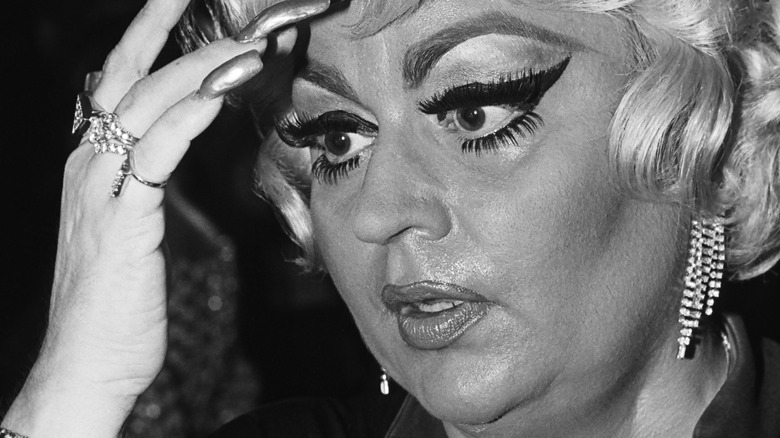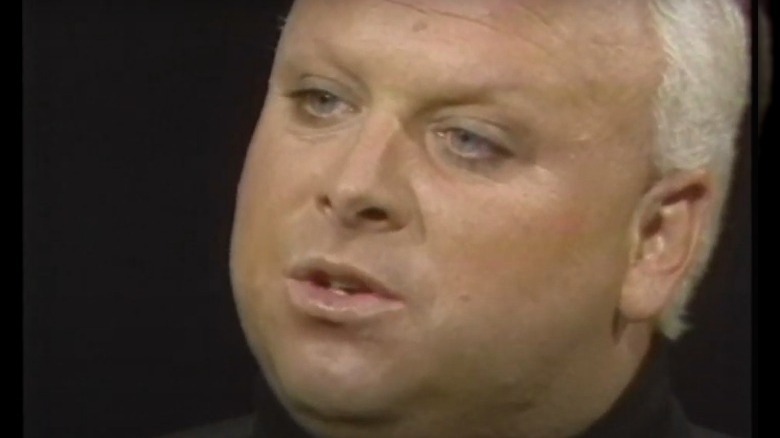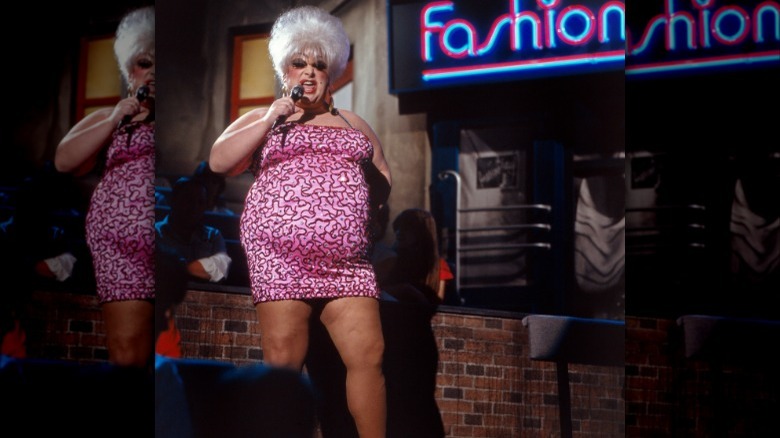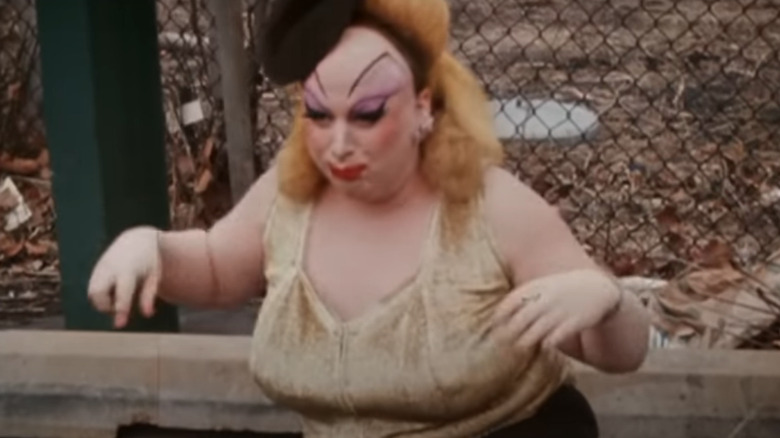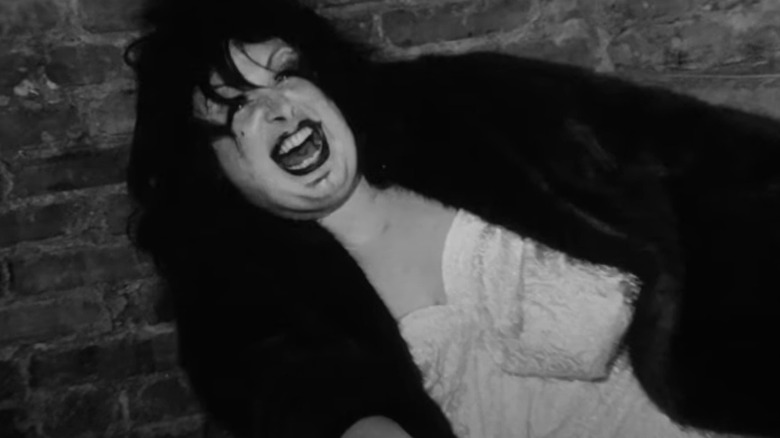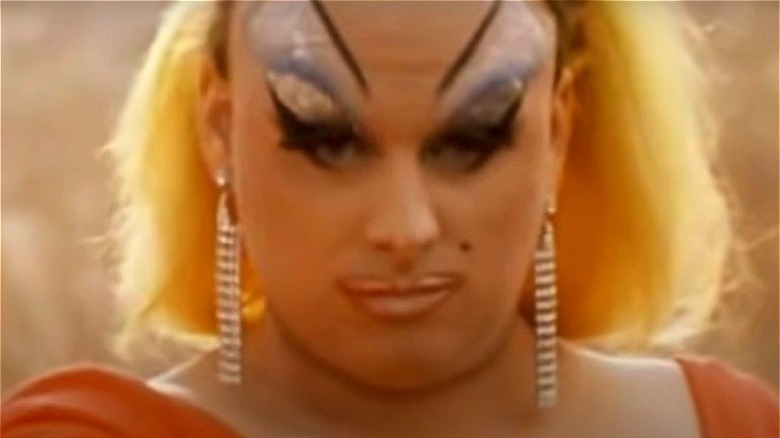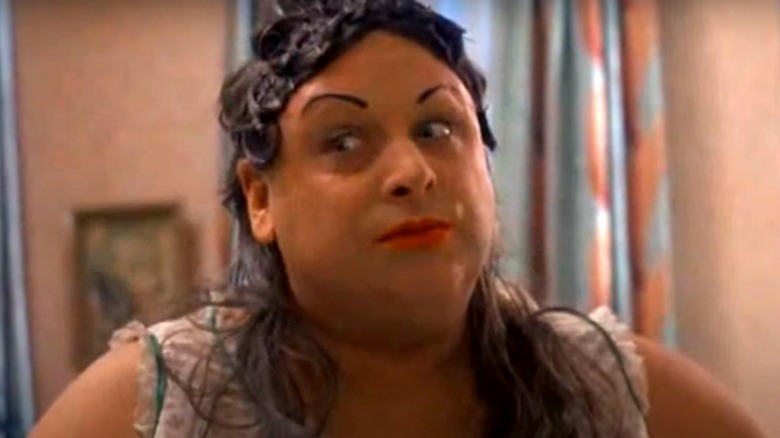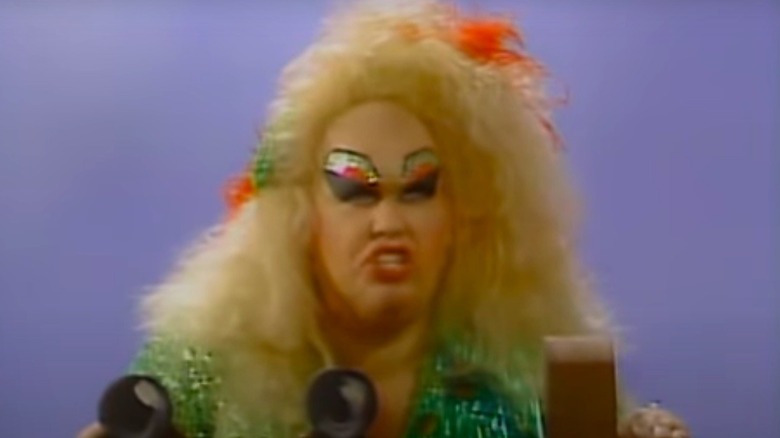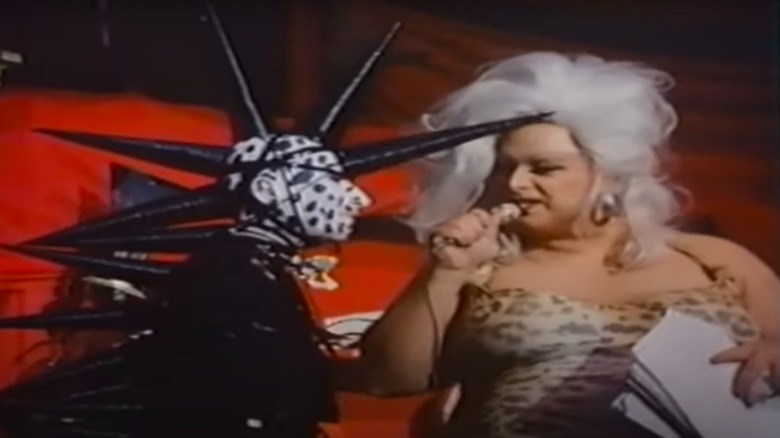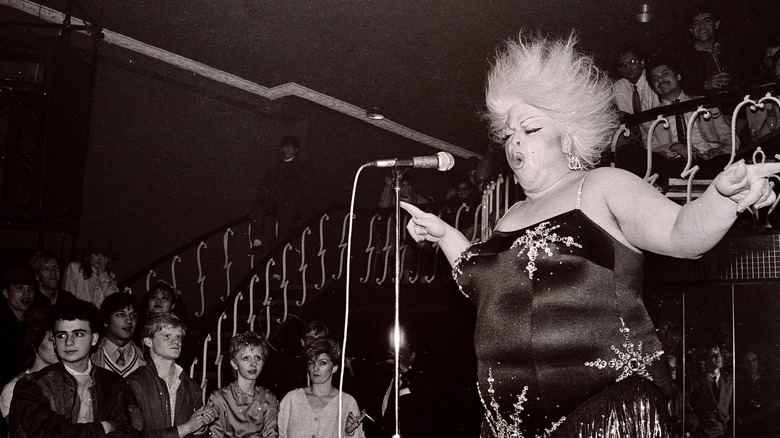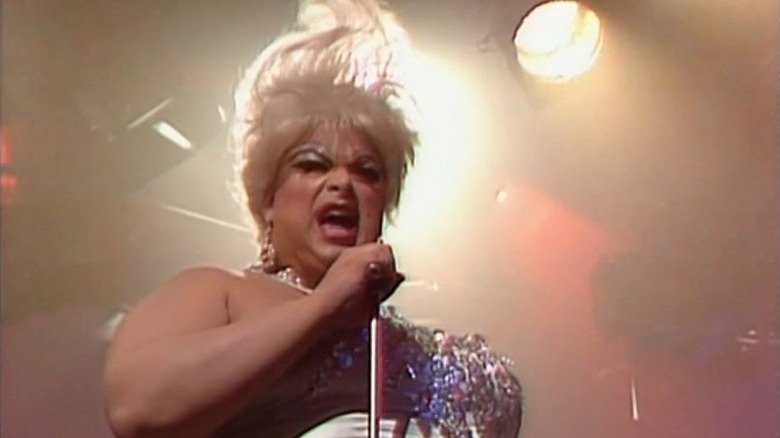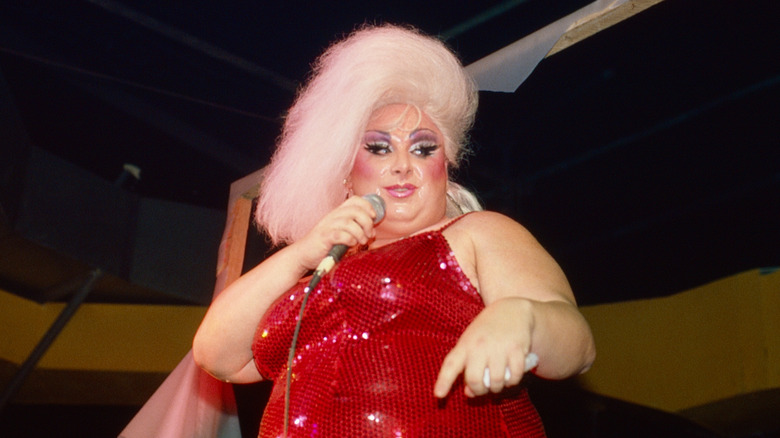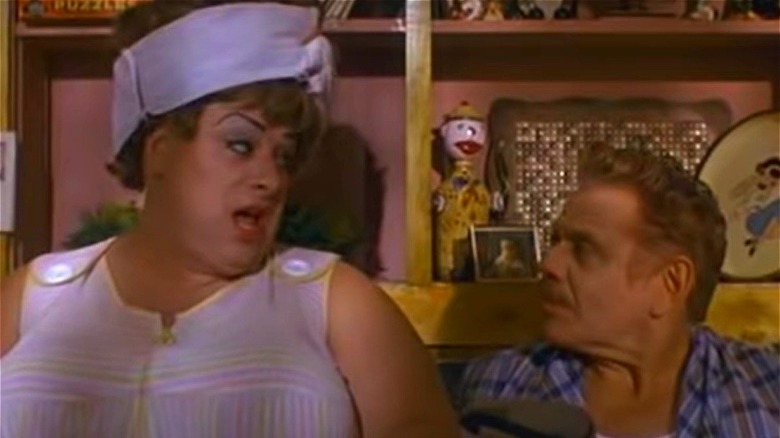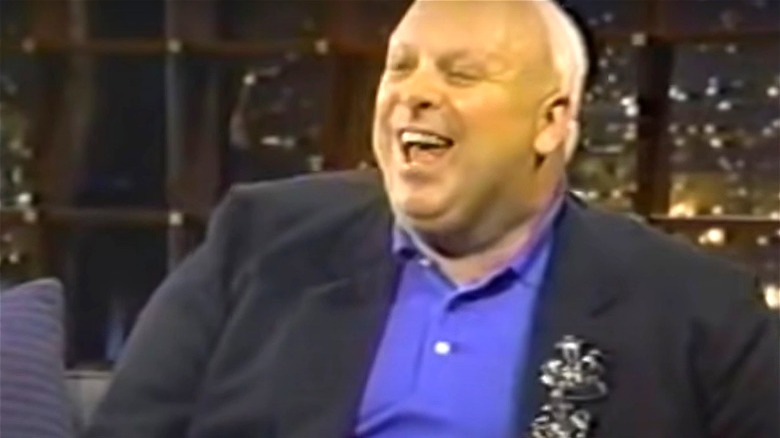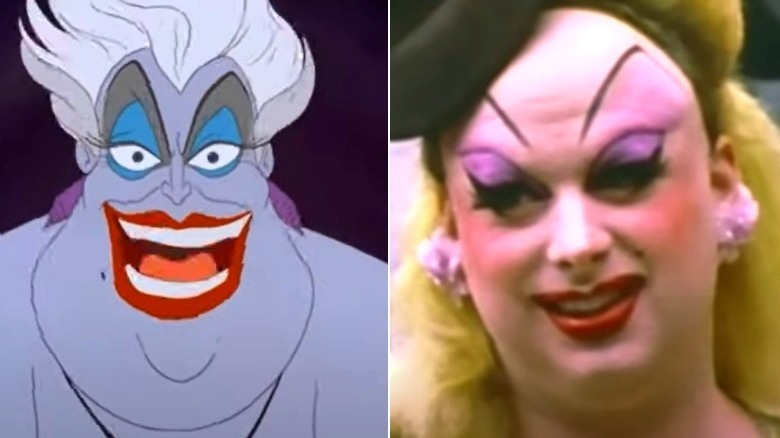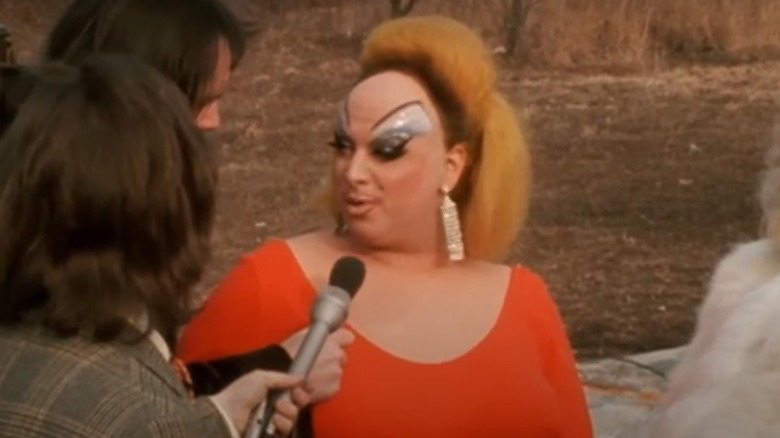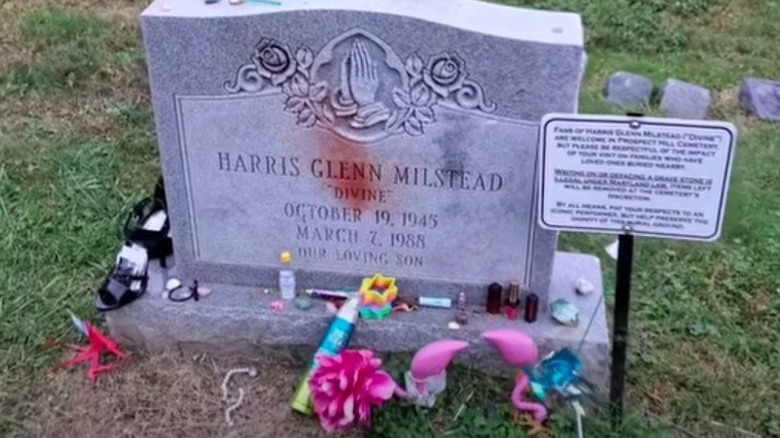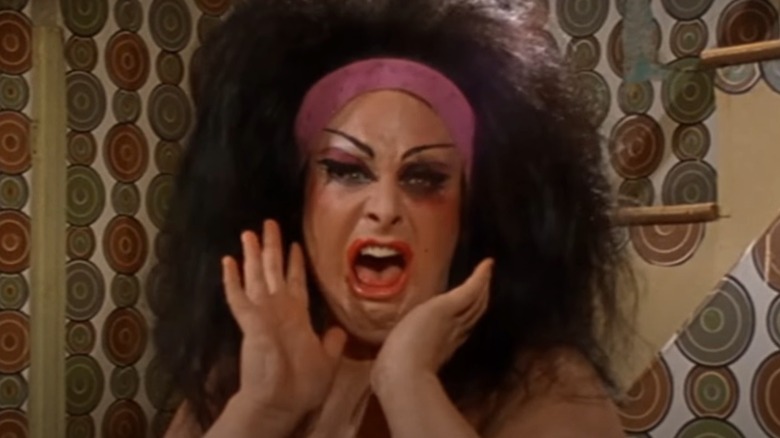The Unforgettable Life And Career Of Drag Superstar Divine
This article contains references to homophobia.
Harris Glenn Milstead, more commonly known as Divine, became the larger-than-life star in many of director John Waters' raunchy trash films. The female impersonator from Baltimore grew from the underground midnight circuit into some of the most memorable films of the '70s and '80s. While the cult followings of these films helped turn Divine into an indie film star, their relatively minimal mainstream success also meant that he remained a bit of an unknown to wider audiences.
Divine passed away in 1988, a result of complications from an enlarged heart. He was just 42 years old, but he left behind quite a legacy. In People's obituary for the star, Brad Darrach wrote with about how the entertainment industry had woefully underestimated Divine as a character actor and performer. Ironically, just prior to his death, his talents were finally being recognized by the mainstream. "He was the Drag Queen of the Century," Darrach wrote. "... [But] it was easy to laugh him off as the Goddess of Gross."
Thankfully, Divine is now remembered as a prominent figure in the film industry. Not to mention, he also had an underrated music career that may have influenced contemporary electronic music. But, his life and career pathway were also sadly riddled with personal struggles and frustrations.
Divine was bullied as a child
Growing up in a big Victorian house and affluent neighborhood in Baltimore, Harris Glenn Milstead had anything but an idyllic childhood. As reported by People, he endured horrific bullying throughout his adolescence. "School itself was a nightmare," the outlet noted. "The other boys, [Divine] said, saw him as 'this big Nellie queer' and beat him." In an interview with NPR's "Fresh Air," Divine explained about his bullies. "They used to wait for me every day to beat me up after school and to the point where I was quite black and blue and afraid to say anything 'cause they had threatened my life," he said. "It was very bad. You know, finally one day, I had to go for a physical to the doctor. And when I disrobed, I mean, it was quite obvious that something terrible was happening to me."
That doctor's visit forced him to reveal his ordeal to his parents, who contacted the police. The bullies were expelled, but Milstead's popularity plummeted even more. He eventually found his people and got the respect he deserved. It was here that he met director John Waters. Rather than compartmentalize his conflicts and attempt a conventional life, Milstead embraced and celebrated his difference. He used his anger, his talents in self-expression, and the nickname given to him by Waters, Divine, to give birth to the character that would live on decades after his death.
If you or a loved one has experienced a hate crime, contact the VictimConnect Hotline by phone at 1-855-4-VICTIM or by chat for more information or assistance in locating services to help. If you or a loved one are in immediate danger, call 911.
Body image issues plagued Divine from childhood
Divine looked confident and powerful in his body, but the actor had struggled with his weight ever since he was young. "I was very much an introvert," he told "Fresh Air." ""I was very uptight about my weight and about the way I looked. And I always wanted to look like everyone else." He elaborated that it was only once he met and befriended John Waters and the rest of their pals at the age of 16 that he finally discovered the confidence to be himself and enjoy a social life. Still, his body image issues remained. "I was always in a coat," he noted. "I always had a raincoat on or something. People probably thought I was a flasher."
Despite finding success and an audience that loved him for owning his body, Divine's self-consciousness still lingered. While shooting his final film, "Hairspray" alongside Ricki Lake, his makeup and big hairstyle allowed him to blend in with the other cast members in costume. While he usually felt insecure about his size, on this set, he finally felt at ease. "I looked just like one of the girls on the street," he gushed. "... Oh, it was good. I mean, that was the best compliment ... I did fit right in. I did look exactly the way I was supposed to."
The infamous scene that followed Divine forever
Among all the memorable films and scenes, there is one moment that stands out in Divine's career. For those who are not aware or don't instantly recall the revolting scene in question, we're referring to his eating of real dog feces in "Pink Flamingos." To get the shot, they followed the dog around for three hours waiting for it to do its business. "We finally had to give it an enema," Divine told the Chicago Tribune. Afterward, the actor wondered if he might become ill. "So I called the hospital," he told "Fresh Air." "And I said ... my son just ate dog doody. And what should I do? And she said, 'Well, how old is your son?' And I said, 'Well, he's 24 years old.'"
The dubious nurse recommended he give his mouth a scrub and keep an eye out for worms, which he momentarily feared he contracted, but never actually did. That scene would follow both Divine and filmmaker John Waters around for most of their careers. According to Senses of Cinema, other queer cinema works which followed were expected to live up to the queasiness of the scene — and failed. "Nothing seems to come close to watching Divine eating dog s*** and licking his lips," the outlet noted.
As for Divine, the scene seemed to haunt him. "It became legend," Waters told Baltimore. "He got sick of it, which I don't blame him. He got sick of talking about it because people were frightened of him."
He performed with an avant-garde stage troupe
After starring in John Waters' first two feature-length movies — 1969's "Mondo Trasho," and 1970's "Multiple Maniacs" — Divine joined the filmmaker in leaving their native Baltimore for San Francisco, then the apex of the counterculture hippie scene. In an interview with the UCLA Film & Television Archive, Waters recalled that it was here where they entered the orbit of The Cockettes, an avant-garde theatre troupe that had agreed to show Waters' films during their performances. According to Waters, at that point, Divine still thought of himself as Glenn Milstead, an actor who had played Divine in Waters' movies.
That all changed the moment he met The Cockettes, whose drug-fuelled, drag-inspired shows fused San Francisco's gay subculture with the hippie scene in a truly radical way. "The hippies would have been scared of The Cockettes," Waters quipped. As soon as he met the group the erstwhile Mr. Milstead embraced his screen persona completely. "He flipped over," said Waters. "He was Divine forever then. He never went back to being Glenn Milstead after that night." In addition to his presence onscreen, Divine also performed onstage with the group during their stage show, "Journey to the Center of Uranus." Dressed like a cross between Zsa Zsa Gabor and a giant lobster, Divine performed The Cockettes' song "A Crab on Your Anus Means You're Loved." "I think that Divine had such an outrageous look that the Cockettes respected his fashion sense," Waters mused.
How divine found his look
Divine's iconic look, a direct assault on the traditional drag queen appearance of the times, made him legendary. His makeup was flashy and his attitude flashier. But the performer never really loved putting all that effort into the costume. Created by makeup and costume artist Van Smith, Margilit Fox of The New York Times broke down Divine's look into three categories. "First was the hair, shaved back to the crown to allow more room for eye makeup," she wrote. "Second was the makeup, acres of eye shadow topped by McDonald's-arch eyebrows; lashes so long they preceded the wearer; and a huge scarlet mouth. Third were the clothes: shimmering, skintight numbers that gave Divine (né Harris Glenn Milstead) a larger-than-life female sensuality."
Divine may have made it look fun, but dressing up was hard work. "He was fat. It was too hot to wear all that s***," John Waters told Vulture. "He couldn't wait to get that wig off. The t*ts were so hot. He hated it." As for those breasts, it took Divine a long time to get them right. "I wanted them to jiggle properly," he said on "The Late Show." "We filled these big pads with lentils, and of course, to get them big enough to be in proportion to my size, I was like a 65DD." They may have nailed the bounce-factor, but they were too heavy. "We went through old rags, anything, newspapers, balloons, tried everything. Finally ended up with carved foam rubber."
Divine's lavish lifestyle was a lie
Divine often lived a life of luxury whether he could afford it or not. When he was young, he would throw extravagant parties where money was no object. Per People, the star lived off credit, blowing money he didn't have on renting extravagant homes filled with staff and entertaining his friends within their walls. He managed to evade creditors by bouncing between addresses, but eventually, his credit went kaput and the jig was up.
As an adult, he kept on with his wild spending ways. "Divine was fiscally irresponsible," John Waters told Baltimore, adding, "When he died, he had given his mother a swimming pool, and I think they had to fill it in." His friend, Pat Moran, elaborated that his mom was at least aware of his son's lifestyle after his death. "Divine's dead, and there's a big, fat hole in her yard in Florida. Also, I believe at the opening of 'Hairspray,' he had a mink coat delivered to her. But then, shortly thereafter, as you know he died shortly after that, they said, 'Well, this was rented.'" According to Waters, "He lived like a movie star even when he had not one penny." As a result, the IRS came in and confiscated his belongings after his death. They then held an auction, earning over $11,000, which was used to help pay for unpaid back taxes.
John Candy impersonated Divine more than once
By the early 1980s, Divine's fame had become so mainstream that he experienced a unique "perk" of being a celebrity: being spoofed in a television sketch-comedy show. That was the case in 1982 when Candadian comedy actor, John Candy portrayed Divine as the star of a stage production of "Peter Pan" for an episode of "SCTV." In the sketch, Candy-as-Divine dangles precariously from wires while exhausted stagehands struggle to keep him aloft. Candy wound up impersonating Divine again, in a deep-voiced performance of "Santa Bring My Baby Back to Me" during a guest-starring appearance on "The Dusty Towne Sexy Holiday Special."
When the clip of Candy impersonating Divine in "Peter Pan" was shown during the "Uncle Buck" star's appearance on "The Late Show with David Letterman," he deadpanned, "I'm stretching as an actor in this one." Host, David Letterman asked Candy if he'd ever had the opportunity to meet Divine — he hadn't. "We have met Divine," Letterman told Candy, praising his impersonation. "... And you're right on the money with Divine."
Candy later paid homage to his Divine impression on the big screen when he and fellow "SCTV" cast member Eugene Levy co-starred in the 1986 comedy, "Armed and Dangerous." As the Los Angeles Times reported, Levy and Candy came up with that particular scene themselves, in which their characters don disguises using whatever they can find in a porn shop, with Candy's character dressing in a Divine-inspired drag look.
Divine once hosted an alternative beauty pageant
Divine wasn't shy about capitalizing on the notoriety he'd achieved through his scandalous roles in John Waters' 1972 cult classic "Pink Flamingos" and its 1974 followup "Female Trouble." That was the case when he was invited to host a 1978 beauty contest that was perfect for his outrageous persona — the Alternative Miss World Pageant. Held in London, the pageant boasted a circus theme, and lives on for posterity in the documentary "I Wanna Be A Beauty Queen."
As the footage demonstrates, Divine's performance was downright subdued, and there was a very good reason for that. As author (and Divine's one-time agent) Bernard Jay wrote in his biography "Not Simply Divine," the star had been stricken with the flu and was under heavy sedation onstage. "Andrew [Logan, who held the pageant] wasn't paying me anything to do it, so I didn't think it mattered if I was dreadful," he told Jay. "Anyway, you should have seen the contestants. They made me look like Vivien Leigh."
Due to his medicated state, Divine hadn't realized the pageant was being filmed for the aforementioned documentary. That led to the bizarre scenario of Divine receiving an invite to attend the London premiere of a film he didn't realize he was in. Because no contract had been signed, Divine was able to negotiate a fee of $5,000 to secure his permission for "I Wanna Be A Beauty Queen" to be released.
Divine had a legit music career
While it's Divine's movies that have become most associated with his legacy, one aspect of the subversive star's showbiz career often goes forgotten — his sideline in music. It all began when his agent, Bernard Jay, encouraged him to supplement his income by performing in nightclubs. The success of those shows led him to begin recording several of his own disco singles. Among these were "I'm So Beautiful," "You Think You're a Man," "Love Reaction," and "Native Love (Step by Step)," all of which showcase how Divine's gravelly voice could be complemented by thudding disco beats.
As Jay wrote in his book "Not Simply Divine," Divine's music career took some time to get established. For one thing, his music was more popular in Britain than it was in the U.S. In fact, although the single, "Love Reaction," hit No. 65 on a British magazine's dance charts, but immediately vanished. However, another track proved to be the breakthrough they'd been looking for, with Jay writing, "'You Think You're a Man' was an instant hit; far greater than Divine's previous records ... the record climbed to number 16."
Later, as he became a household name, Divine became known for his extravagant performances at Peter Stringfellow's Hippodrome Club. During one show, he brought Independence Day celebrations to Britain, with a stage show that included fireworks, lasers, and a bevy of male bodybuilders. In another, he was accompanied by a dancing baby elephant — and as ever, not without controversy.
His 'obscene' performance on TOTP caused outrage
The success of Divine's single, "You Think You're a Man" in the U.K. led to an invitation to perform the song on "Top of the Pops," the iconic British TV show showcasing the hottest new music. While the 1984 performance gave Divine mainstream television exposure in Britain, the appearance also led to controversy when families tuned in for it. "Following the transmission, the TV station's switchboard was, supposedly, flooded with over a thousand calls, angrily complaining about 'the fat lady' their children had been exposed to that evening; 'it was disgusting, obscene,'" recalled Divine's agent, Bernard Jay, in his book "Not Simply Divine."
Interestingly, "You Think You're a Man" was written by Geoff Deane, who went on to write the hit musical "Kinky Boots." The song had reportedly been intended for disco queen Gloria Gaynor but landed in front of Divine when Gaynor passed. While the track has gone on to become Divine's signature song, it has also taken on a life of its own since. Versions of the song have appeared in TV shows like "It's a Sin" and "Queer as Folk," and it has also been covered by bands like Full Frontal, Tim Campbell, and The Vaselines.
He never considered himself to be a drag queen
There's no denying that the rise of RuPaul in the 1990s paved the way for his current success in the 2020s, evidenced by umpteen iterations of "RuPaul's Drag Race" and the numerous queens who have sashayed their way into viewers' hearts. However, back in the 1970s when Divine first began glamming it up in women's clothing, drag queens were far from attaining the ubiquitous television presence they would ultimately achieve.
While Divine was arguably the most famous drag queen of his era, it was a label he not only didn't embrace but one that he outright balked at. "I'm not a transvestite. I'm not a drag queen. I'm a character actor," Divine declared in an interview with "Fresh Air." "I never set out in the beginning of my career just to play female roles."
As he explained, it had simply worked out that way, since the only roles the actor Harris Glenn Milstead was being offered were female characters — and when those characters were big ones, in increasingly larger movies, who was he to say no? "So you don't go around turning down parts that are the leads or that are written for you if you're a young actor," he explained of how he'd become pigeonholed by the success of the persona he'd created. "I had no idea that they would be such strong characters — that people thought that was all I could do."
In his final role, Divine finally found mainstream stardom
Divine's film work is often undersold. After getting his start in the John Waters short "Roman Candles," the star took on his first starring role, playing a fictionalized version of Jackie Kennedy in "Eat Your Makeup." Aside from recognition in the hippie subculture, Divine first gained true notoriety from the controversial film, "Multiple Maniacs." His next film, "Pink Flamingos," took up permanent residence as the midnight movie at the Elgin Theater in Manhattan.
More than 45 years later, "Pink Flamingos" continues to shock and delight in equal amounts. "It still works, I know that," Waters told Vanity Fair in 2017. "It didn't get nicer; it might have even gotten more hideous. Even people who think they've seen everything are sort of stunned by it. They may hate it, but they can't not talk about it. That was the point. It was a terrorist act against the tyranny of good taste."
In "Polyester," Divine took center stage in a studio film for the first time. The film continues to be revered as a cult masterpiece, and Divine's surprisingly vulnerable, comedic performance remains at the heart of it. Just weeks before his death, his final film and Waters collaboration was released. "Hairspray" garnered great reviews, and even went on to spawn a Tony-award-winning Broadway play, a 2007 reboot film, and a live TV musical. It would also cement widespread respect for Divine's work as an actor.
Mainstream fame was imminent when Divine died
Divine found fame in drag, but he longed to make his mark without it. In 1985, he took an out-of-drag role in "Trouble in Mind" and earned praise for his performance. He then nabbed a part in "Married ... with Children" but died before filming. "I've never seen him happier," his manager, Bernard Jay, told People. "His career was taking off. He was actually going to play a very good character role on a network television show. That's what he wanted. To show them that he didn't have to play women, that he was respected as an actor, that he was not regarded as a freak. ... But he didn't make it."
The Chicago Tribune reported that Divine was receiving major scripts for a range of horror and exploitation movies, and had even auditioned for a small role in Ridley Scott's "Blade Runner." According to Bloody Disgusting, those scripts included a role in "Freddy's Dead: The Final Nightmare" — a part that he reportedly won. In John Waters' mind, all that exposure might have spelled the end of their collaborations.
"If he was alive, he might have been too expensive for me," he told Baltimore. "The day after he died, he was supposed to be shooting 'Married ... with Children,' where he was playing a gay man on a huge, hit television show, which they had never done before. It probably would have been hugely successful ... He wanted to play everything."
Divine was a Disney inspiration
Few Disney villains can match what Ursula brings to the screen in "The Little Mermaid". Her evil schemes rate highly, but it's her looks and her attitude that really put her in a place of such high esteem. Amazingly, it was those qualities that were influenced by Divine. According to Hazlitt, many designs were bounced around for the early iterations of the film's iconic sea witch. However, it wasn't until an animator by the name of Rob Minkoff dished up a Divine-inspired campy villain that they found one they liked. The lookalike image worked out perfectly, and Howard Ashman, who created the music for the film, took it and ran with it.
Back when he was a subversive pop star in the '80s, Divine was renowned for his unique style of performing. Blending punk theatrics with the depravity of his femme-fecal persona, Divine thought nothing of unleashing his monstrous side against an audience — spitting and snarling his way through a performance. Watching Ursula's attitude and gestures during "Poor Unfortunate Souls," it's not difficult to see the connection.
Sadly, Divine passed away without seeing the character he inspired. Documentarian Jeffrey Schwarz told Hazlitt that the star would have been flattered by the character. "He would have wanted to play the part himself," he said. John Waters agreed that the role would have been a great honor to depict. "When I was young, all I wanted to be was a Disney villain," he said. "My idol was the stepmother in Cinderella."
His life spawned a hit documentary
Divine's life may have been a short one, but it was certainly impactful enough to inspire the 2013 documentary "I Am Divine." Directed by Jeffrey Schwarz, the film features archival footage of Divine, as well as new interviews with the likes of director John Waters, Divine's frequent co-star Mink Stole, and even his mother, Frances Milstead. As a documentary, "I Am Divine" is no slouch; not only is it listed as one of Movieweb's best documentaries about actors, but the film has also racked up a coveted 96 percent score on Rotten Tomatoes.
Upon the film's release, reviews were uniformly glowing. "It's surprisingly moving stuff — dressed up with just enough archival outrage to remind you how scandalous Divine once seemed," wrote film critic Mark Kermode in The Guardian. For The Independent, reviewer Geoffrey Mcnab noted how the movie highlights the way that Divine's scandalous, envelope-pushing persona was at odds with his real-life kindness and sweet nature. But a review from the Express perhaps sums up the film best, stating, simply, "A joyous hurrah for a unique figure."
Divine's grave has been a source of controversy
After his death in 1988, Divine was buried in his hometown of Baltimore, in the Prospect Hill Cemetery situated in the suburb of Towson. As Atlas Obscura pointed out, the headstone — bearing Divine's birth name, Harris Glenn Milstead — isn't difficult to locate. However, this has led to some of his more rambunctious fans defacing his gravestone as a form of tribute.
In 2021, the Baltimore Fishbowl noted that this behavior had led to something of a pattern – fans would spray paint filthy phrases on the headstone, staff would clean it up, and the pattern would continue to repeat, over and over. Finally, cemetery administrators had come to the end of their collective rope. As a result, the cemetery took decisive action — by putting up a sign. Pointing out that numerous other people who weren't vying to become the world's filthiest person are also buried there, the sign asked fans to be respectful when visiting. It also explained that Maryland law has deemed it a criminal offense to deface or write on a gravestone. "By all means, pay your respects to an iconic performer," the sign implores. "But help preserve the dignity of this burial ground."
Believe it or not, the sternly worded sign did little to quell the twisted enthusiasm of mourners. As Balitmore Fishbowl subsequently reported, a mere three months later the headstone had been adorned with a big splotch of red spray paint.
Divine was an undeniable drag icon
Divine may not have been a drag queen in real life, but he played one on screen, and he was deified for it. Through his characters, Divine took on Hollywood's notions of gender and power. His female impersonations screamed personality, originality, and courage, something that many believe drag lacked before Divine. "His legacy was that he made all drag queens cool. They were square then, they wanted to be Miss America and be their mothers," John Waters told Baltimore. "Divine frightened drag queens because he would show up with a chainsaw and ... fake scars on his face, wearing mini skirts when you're 300 pounds." The influential filmmaker told the publication that Divine was decades ahead of the current generation of avant-garde, rule-breaking drag queens.
It was his fearless approach to life that has allowed the actor's memory to stand the test of time. "Divine was irreverent, and he lived life to the fullest, which I think is something important for everybody," friend and photographer Greg Gorman told Vogue. "It's about being who you are and standing up for what you believe in." Filmmaker Jeffrey Schwarz thinks that Divine would have become even more legendary should he still be alive. "He probably would have been a grand dame of the drag world — he would be like the Dame Judi Dench of the drag women," Schwarz told Vice. "We can't know, but maybe it would have been 'Divine's Drag Race' instead of 'RuPaul's Drag Race'.

